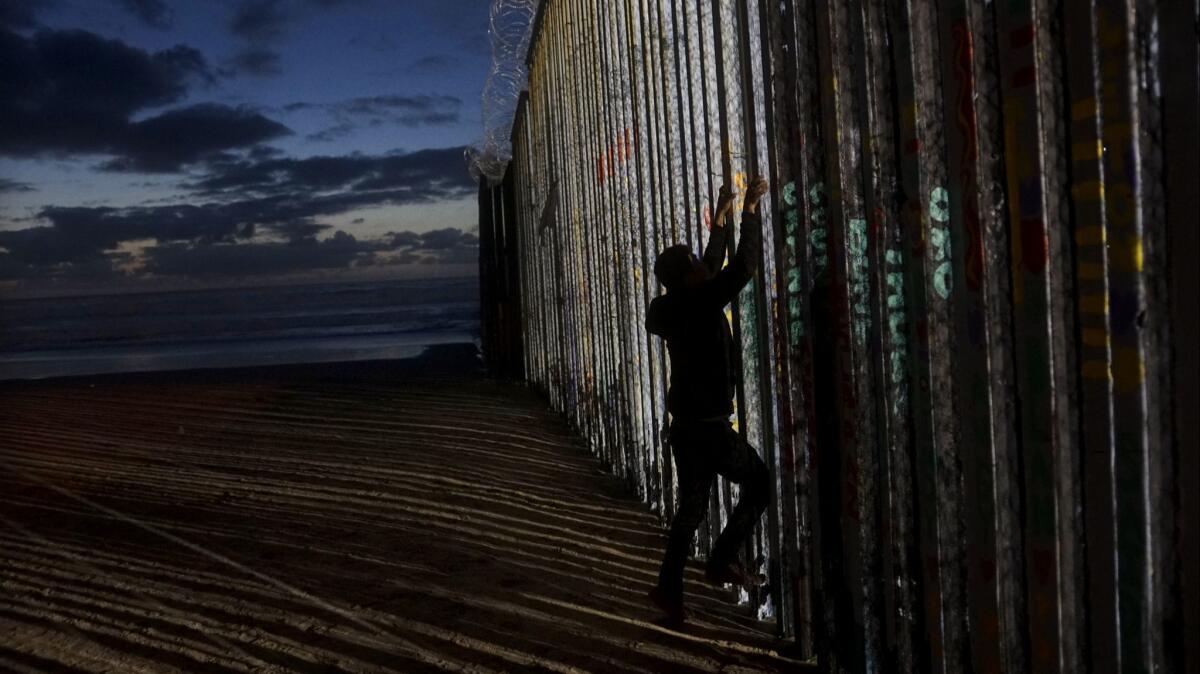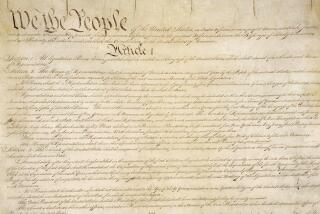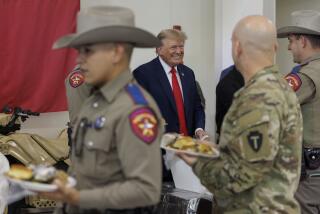Op-Ed: Why Trump can’t simply build his wall. Hint: It’s that pesky Constitution

As 800,000 federal employees enter another week without paychecks, any way to end the country’s budget impasse has appeal. But the solution is not the one President Donald Trump has been floating in recent days: that he will simply invoke emergency powers and build a wall between the United States and Mexico without congressional approval. Doing so would constitute an unconstitutional and dangerous expansion of presidential power.
Thankfully, the United States Constitution does not give the president emergency powers, and it has no clause that allows the president to suspend the Constitution when he perceives an emergency. Quite the contrary, the Constitution was deliberately written to keep government officials from claiming dictatorial powers in the name of national security or emergency management. The Constitution is clear that Congress controls the power of the purse and must approve the spending of all federal money. No exception to this is mentioned in the Constitution or has ever been recognized by the courts.
Trump is not the first president to try to claim emergency powers. During the Korean War, President Harry Truman ordered the seizure of steel mills when a labor dispute threatened to close them. Truman argued that national security and the war effort depended on continued steel production. But In Youngstown Sheet & Tube Co. vs. Sawyer, in 1952, the Supreme Court ruled against Truman, concluding the president had no authority under the Constitution or federal laws to do this even in a wartime emergency.
In a separate opinion, Justice William O. Douglas explained that seizing the steel mills would require that Congress appropriate funds to pay for the taking of private property, and the president cannot take over the spending power, which belongs to Congress, in this way. Both Justice Robert Jackson and Justice Felix Frankfurter, in their separate opinions, stressed that Congress had considered giving the president this power but did not do so.
This is directly relevant today, since Congress for the last two years has considered and rejected funding for Trump’s wall.
Enter the Fray: First takes on the news of the minute from L.A. Times Opinion »
The president is likely claiming authority to fund building the wall under the National Emergencies Act of 1976, but that law actually was meant to limit the ability of the president to claim powers by declaring a national emergency. One provision says that if there is a national emergency, funds in the Defense Department budget that are not “obligated” can be used for construction projects to support the armed forces. It says: “Secretary of Defense, without regard to any other provision of law, may undertake military construction projects, and may authorize Secretaries of the military departments to undertake military construction projects, not otherwise authorized by law that are necessary to support such use of the armed forces.”
The clear purpose of this was to ensure adequate space for military mobilization in the case of an emergency requiring a large number of troops. It is hard to imagine a court finding that there is an emergency within the meaning of the statute in this situation where nothing has changed. This is about Trump wanting to carry out a campaign promise, not an emergency that has suddenly arisen. Moreover, the statute is about construction projects to support the armed forces. Trump’s wall is not about that at all.
Any attempt by Trump to build the wall without congressional approval would be a grave threat to separation of powers. Under the Constitution, every major action of the federal government generally should involve two branches of government. Enacting a law, including adopting a budget, requires Congress passing a bill and the president signing it, or Congress overriding a veto. Going to war requires Congress declaring war and the president, as commander-in-chief, waging it. Enforcing a federal law requires that the executive branch bring a prosecution and the judiciary convict.
No Supreme Court decision in U.S. history ever has approved the ability of the president to circumvent these checks and balances by spending a large amount of money without congressional approval. That would be a dangerous precedent and one inconsistent with a Constitution founded on the idea of checks and balances.
Throughout his time in office, President Trump has chafed at the limits the Constitution imposes upon him, as have other presidents occasionally before him. That is a key reason, let’s remember, that the nation’s founders wrote the document: to set out clearly the limitations of a president’s power. Once again, more than 200 years after it was written, the Constitution is again serving Americans well in preserving checks and balances.
Erwin Chemerinsky is dean of the UC Berkeley School of Law.
More to Read
A cure for the common opinion
Get thought-provoking perspectives with our weekly newsletter.
You may occasionally receive promotional content from the Los Angeles Times.






